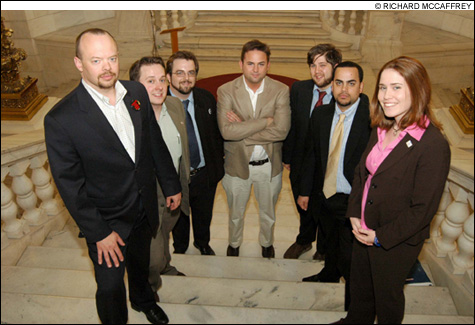
STORMING THE GATEKEEPERS: RI’s Future’s Jerzyk (center, with his contributors) sees blogs as the
information-sharing embodiment of democracy.
|
Matt Jerzyk launched his Rhode Island’s Future blog in January 2005 because, after having worked locally in community- and union-organizing, “I saw first-hand how difficult it was to pene-trate the media cabal with progressive stories of hope and change.” After two months of writing about the then-upcoming 2006 US Senate race between Lincoln Chafee and Sheldon Whitehouse, the blog’s audience grew from a few dozen people to a few hundred.
More than three years later, Rhode Island’s Future is established as a must-read for political types, activists, reporters, and others — including the conservatives who welcome opportunities to scorn the blog’s unapologetically liberal bent — and the site claims 67,000 unique visitors, and 250,000 page views, a month.
Jerzyk, 31, who is about to graduate from Roger Williams University Law School (disclosure: he’s a friend of mine and an occasional Phoenix contributor), is now looking to sell Rhode Island’s Future, to a person or entity that, he hopes, will maintain its character and identity.
Borrowing a phrase from the title of a book by two preeminent liberal bloggers, Markos Moulitsas Zuniga and Jerome Armstrong, Jerzyk takes some valedictory satisfaction in how bloggers have “used a new and powerful medium and ‘crashed the gates’ to ensure that information — the most important ingredient in a democracy — would be available to anyone who wanted to write, read, or debate.”
Across the ideological aisle at Anchor Rising, which has emerged as Rhode Island’s leading conservative blog since it debuted in late 2004, a handful of like-minded individuals were motivated by a similar desire to provide a broader and more consequential forum for their ideas and philosophy.
In one example of how it has made an impact, Justin Katz, a 32-year-old carpenter who wields a formidable intellect as Anchor Rising’s most frequent contributor, points to Providence Journal op-ed columnist Ed Achorn’s use of his tart description — “the Economic Death and Dismemberment Act” — for a budget plan, the Economic Growth and Fairness Act, put forward by some liberal Smith Hill Democrats. “A couple of weeks later, [Achorn] e-mailed to ask whether I’d coined it, because he found it to be an audience-pleaser in speeches,” says Katz, via e-mail (as the interviews with other bloggers were conducted for this story).
“More generally, one gets the feeling of being part of the public debate,” Katz adds, such as when something written by one of Anchor Rising’s contributors, about healthcare, human-service spending, step increases for teachers, or tax and migration trends, “precedes a change of tack on the other side. In other words, bloggers of modest influence can still disprove talking points, and if the right people are reading, then those talking points have been successfully exploded.”
Seeded and inspired in part by this lefty-righty duo, the Rhode Island blogosphere has expanded and grown more sophisticated in recent years, offering a new layer of media (and of media criticism) at a time when metro dailies such as the ProJo, bedeviled by an industry-wide collapse of newspaper advertising, offer a smaller, less expansive scope of coverage than in the past.
“This is such an important part of community,” says Kiersten Marek, a liberal social worker who blogs in Cranston. “When something concerns you in life and you put out a call, you want a response. This is, in effect, what I do on my blog. It concerned me that a concrete plant was suddenly being built in our vicinity without neighbors being informed, so I started to talk about it on my blog. A community group rose up to fight it and I joined that group. Members of that group used Kmareka to discuss news about the concrete plant, to strategize on how to deal with the problem, to publicize ac-tions and events, and to support one another’s efforts. You just can’t get that from the newspaper or from TV. That’s why blogs are revolutionary.”
Perhaps, but considering how the best-read Rhode Island blogs — including my own Not for Nothing — tend to get roughly 2000 visitors a day, does this situation speak more to the splintering of a common media with broad appeal? And can blogs truly take up some of the slack being yielded by newspapers, or do they represent a new era of limited, self-selecting audi-ences reading sources that mostly reinforce their pre-existing views and biases?
The apex of a new approach
Earlier this year, when Brown University graduate Josh Marshall won a prestigious Polk Award for Legal Reporting, it highlighted how blogs and bloggers can play a significant role in political coverage.